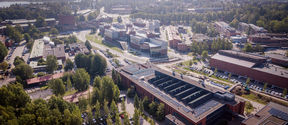A recent survey by Aalto University mapped the activities of Finnish companies and their future prospects, having now lived with the Covid pandemic for about a year. More than 250 corporate executives responded to the survey in April and May. The survey complements a survey conducted by the same research group six months ago, when more than 300 decision-makers participated in the study.
The results paint a surprisingly positive picture of the companies’ future prospects. According to the researchers, companies are shifting away from acute crisis management and are now aiming for new growth. Jukka Luoma, Assistant Professor of Strategic Management, says he was surprised by the results.
‘Our previous study suggested that Covid was having negative effects on companies’ long-term growth. The uncertainty of demand and operational disturbances made it difficult to expand to new markets, for example. Of course, my hypothesis was that the constant uncertainty surrounding the crisis and repeated waves of Covid would cause this trend to continue. However, companies have clearly started to actively strive for growth already. The picture of the future painted by the corporate executives' responses seems surprisingly positive to me.’
Some companies may be less equipped than others to join the upcoming wave of growth. The study indicates that companies that withdrew into their shells in the first months of the crisis by, for example, pulling back on the development of new products and services seem to be less active in the pursuit of new growth.
Lack of skills and knowledge as a bottleneck
There are also bottlenecks on the road to budding growth, the most significant being the availability of skilled workers and components, according to the researchers. In autumn 2020, the research group warned companies of a shortage of experts and growing labour market competition, especially in the fields of new technologies.
‘This is still a current concern. Companies need to look for ways to cope with growing competition. For many companies, this means both active recruitment as well as continuously training existing personnel,’ says Project Manager Susanna Takkunen, who is finishing her doctoral thesis on digital transformation in organisations.
Lauri Saarinen, Assistant Professor of Operations Management, draws attention to the link between organisational agility and the ability to strive towards growth and competitiveness during the crisis.
'Agile organizations have also been able to find opportunities for innovation and growth during the crisis. These companies also seem to be in a better position to start growing again after the crisis. Executives and researchers will both have plenty of interesting lessons to learn from this for the coming years. Resilience is defined as the ability to recover from a disturbance and reach an even higher level of performance. I believe that we will be able to see this impact in well-managed companies in the coming years.’
Superficial and narrow digital leap
The researchers describe the acceleration of digitalisation through Covid as “express digitalisation”.
‘The crisis has clearly increased companies’ capabilities and willingness to introduce new digital tools. However, the drawback of “express digitalisation” is that you can’t simply digitalise practices that have been refined in an analogue environment. When an organisation moves from the office to Teams, something will no doubt get left behind on the way’, says Luoma.
In the study, many respondents said that the amount of work and meetings has increased while the number of occasional encounters has fallen off significantly. According to the researchers, especially in knowledge-intensive work, coordination and cooperation are largely based on non-formal, partly spontaneous interaction that cannot be easily transferred to a remote work environment.
‘For many companies, digitalisation during Covid really just means using remote tools more extensively. So, the digital leap created by Covid is mainly a fairly superficial phenomenon. Even after the pandemic, a wide-ranging digital transformation is a long and challenging change process that requires patience, vision and customer-oriented thinking from leadership’, says Takkunen.
Serving as partners in the implementation of the research are Technology Industries of Finland, Palta, and the Finnish Commerce Federation.
Further information:
Latest research report and other publications by the group












